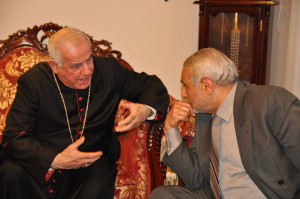Sydney Morning Herald, 20 May 2015
Former jihadis are our best weapon again Islamic State grooming
Shutting the door on former Islamic State recruits seeking repatriation may miss an opportunity to block the radicalisation path. After all, law enforcement strategies and name-calling by government voices have not curbed the magnetism of this “death cult”.
Yes, the chorus of cautious voices is justified. Yes, the disillusioned youth should have renounced IS on the same public platforms that drew them in: online for other youth to see and hear, loud and clear. Yes, the youth who have broken our counterterrorism “foreign fighters” legislation must be subjected to the full force of our criminal justice system, including imprisonment. Yes, we need to ensure that we do not inadvertently create an escape clause for “jihadis” who want to “get out of jail free”.
But if ever there was an opportunity to benefit from these de-radicalised voices, and benefit from the lessons learnt in other parts of the world, this is it. Surely, our intelligence authorities should be trusted to be intelligent enough to harness rather than squander this opportunity.
In Europe, former extremists have long been recruited by organisations such as Exit and the Institute for Strategic Dialogue. These movements recognise that angry, rejected youth need a counter-narrative and “tangible alternatives to violence”. They recognise that “formers” have a credibility that governments lack.
Former extremists now understand the continuum from isolation to belonging to disengagement better than most. They now understand the consequences when one is seduced by the two-dimensional videos then lands in a three-dimensional reality, sometimes cleaning toilets and babysitting. They now understand how to resist these temptations and learn to act on their anger through legitimate channels such as social justice and politics. They now understand what many non-Muslim “experts” are grappling with: why people go and why they return. No amount of funding or education can substitute for the firsthand testimonies of “formers”.
In the United States, the diminution and implosion of the Ku Klux Klan was partly due to former members publicly denouncing its violence, such as the late Elwin Wilson in 2009. For more than a century, former members have proven to be a more formidable force than law enforcement authorities or external critics.
Even in Australia, a mercy campaign involved eminent Australians petitioning for clemency for the “extraordinary rehabilitation” of former drug smugglers Myuran Sukumaran and Andrew Chan, before their tragic execution last month. There was growing recognition that their genuine and demonstrable reform could have aided the war against drug smuggling.
Clearly, cynicism prevails about the sincerity of reformed jihadis returning from the Middle East. The same logic does not apply, yet Australia has never tested this theory of deploying deradicalised and disillusioned youth to aid the war against violent extremism and home-grown terrorists.
Prime Minister Tony Abbott reflected the broad Australian sentiment when he declared that “there is no place in our society for people who have been radicalised”. Perhaps those deradicalised now passionately agree with him, but offer a more credible voice. Perhaps they are now the most potent strings on his bow. Perhaps their testimonials are our best weapon in this battle for young minds.
This logic has been echoed by counterterrorism experts including Professor Michele Grossman, who argue that the most authentic counter-narratives come from disillusioned foreign fighters who are in a unique position because of their firsthand experiences.
Rather than investing $21.7 million in an online social media campaign to counter pro-ISIS propaganda, our government could spend less money by amplifying the testimonials of deradicalised formers through all the clandestine channels. The money could be spent to build resilience and resistance against the groomers and traffickers.
Surely our authorities can discern who among the three young jihadis now seeking repatriation has already demonstrated to other disoriented youth: “wrong way – go back!”
If we are serious about fighting the recruitment of IS and its ilk, we need to learn from international experiences and recognise when opportunity knocks. Before us now, we have people who have been “educated” and exploited as frontline fodder. They can in turn educate us to inoculate other vulnerable youth against this dead-end street, sold as a path to paradise.
What needs rehabilitation now is our policy on these “formers”, when the policy of fear is lifted to give way to clarity.
Our own clemency policy and counter-narrative need not be as black and white as the ISIS propaganda. Conditions apply.


